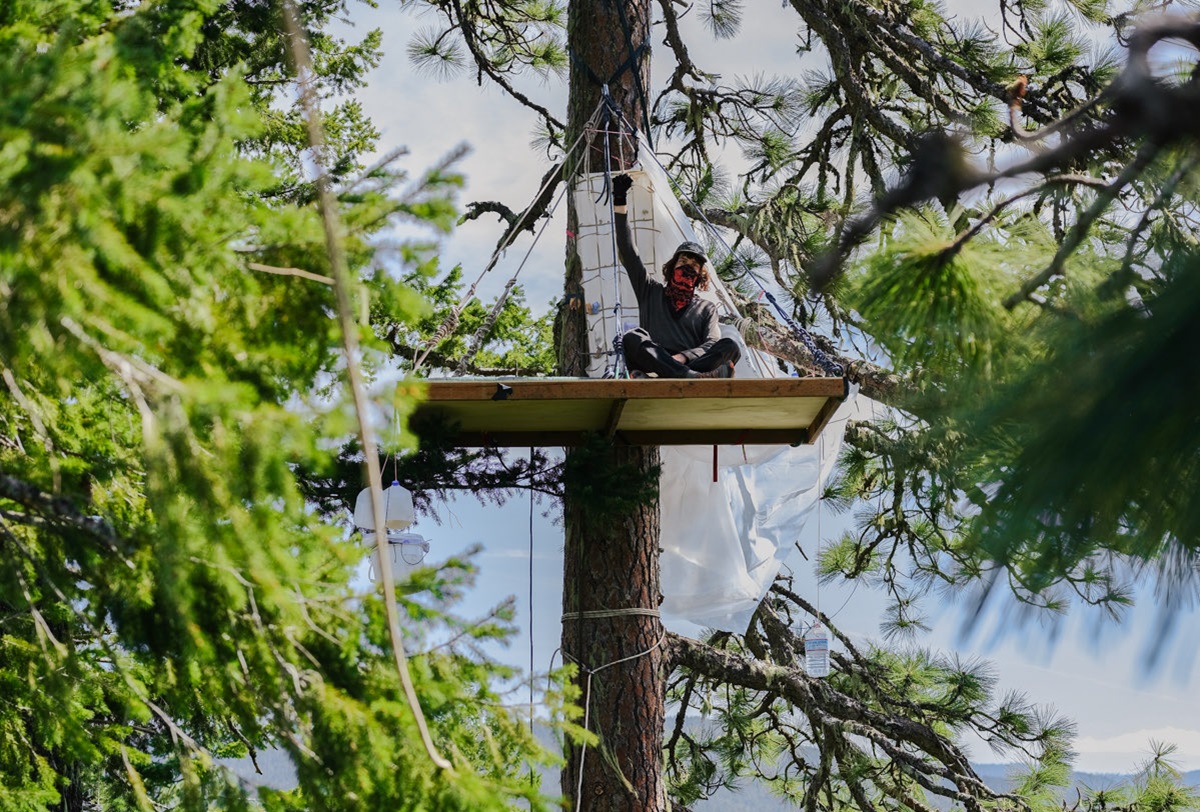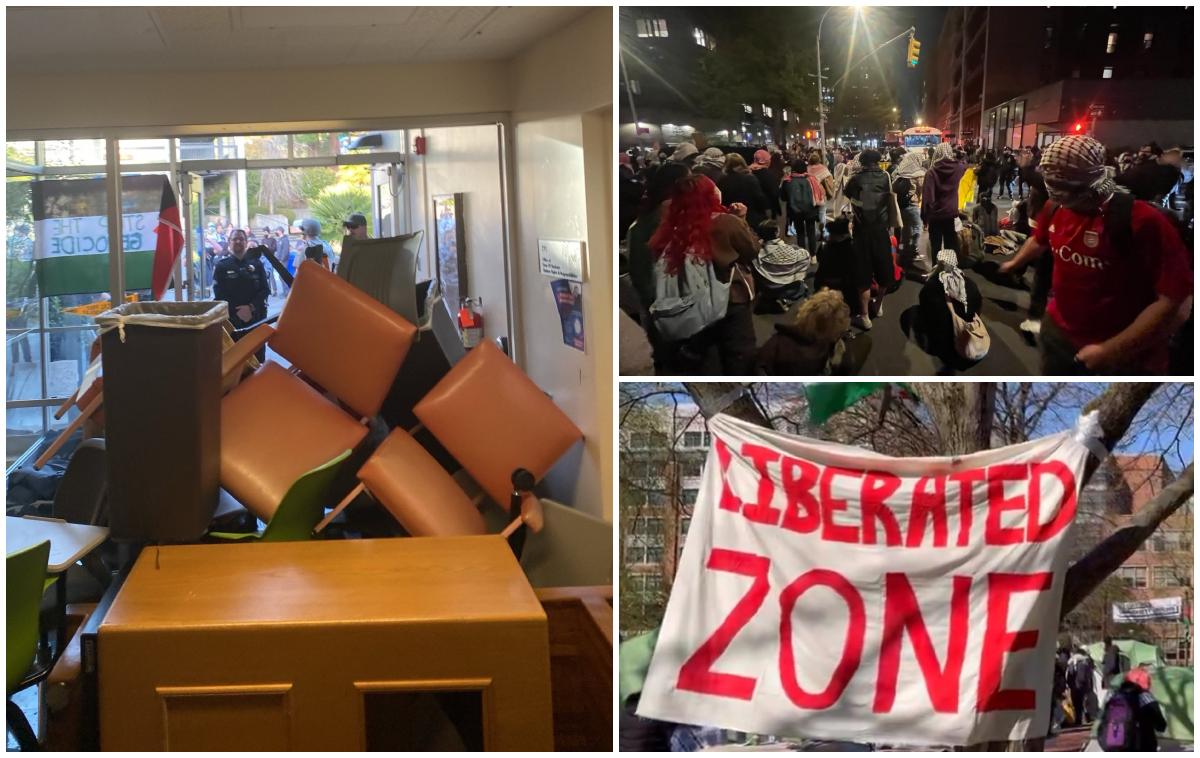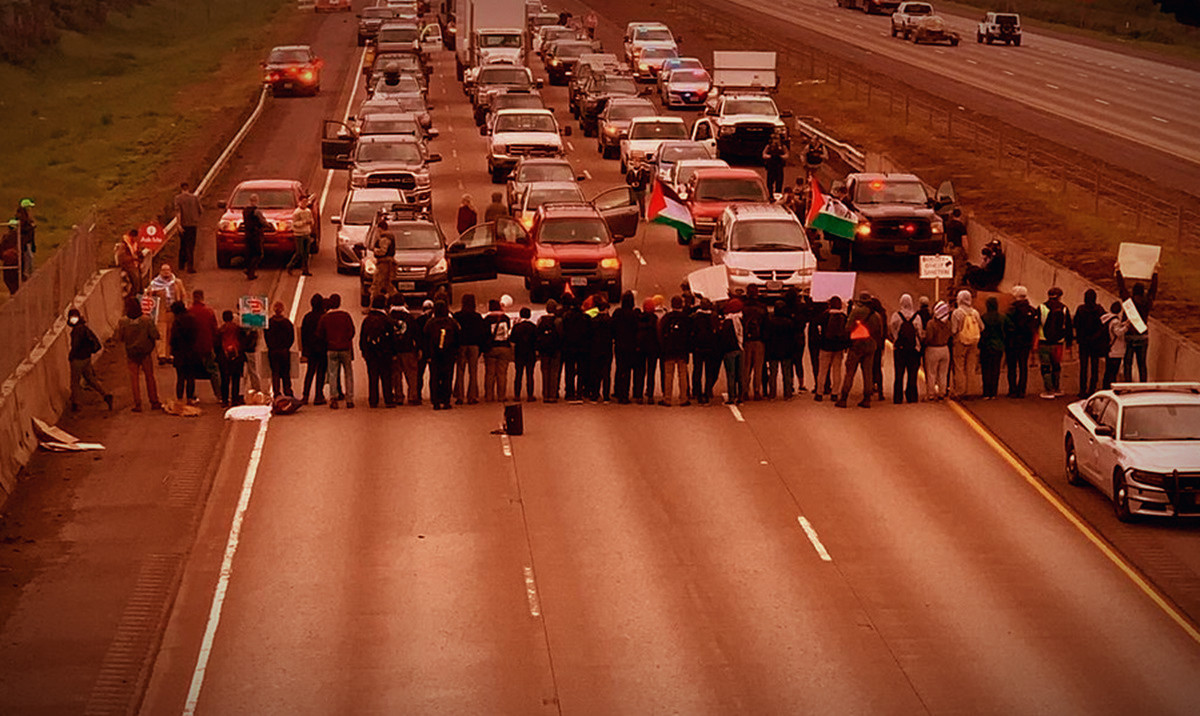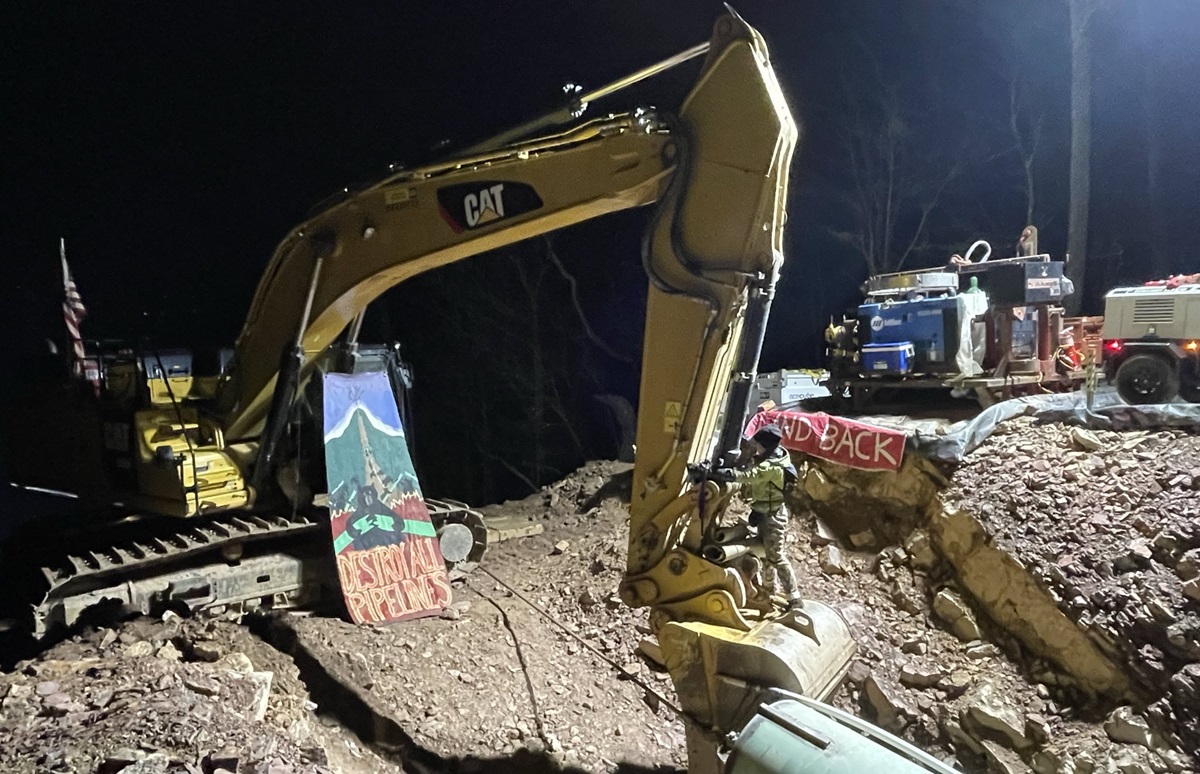Filed under: Action, Housing, Police
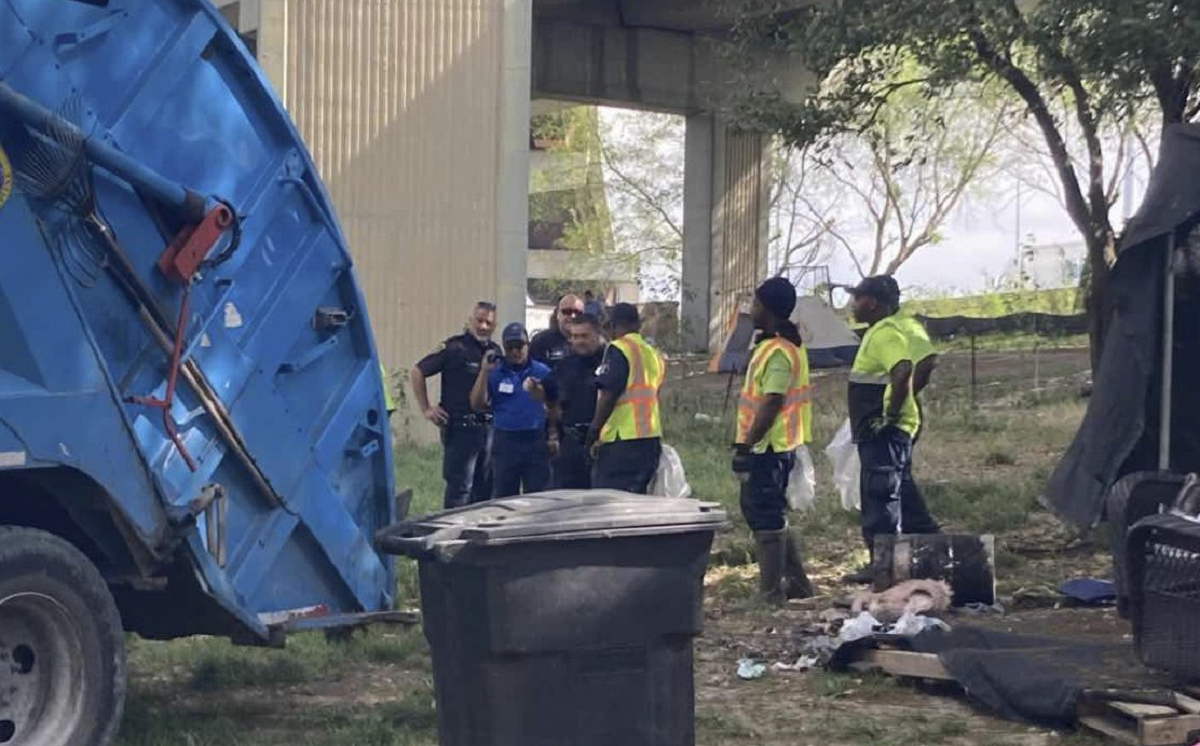
Report back from resistance to sweeps in so-called Houston, Texas from Space City Anarchist Organization.
On Thursday, March 9, a coalition of around 20 Houston anarchists and abolitionists mobilized to oppose a sweep by the City of Houston, Houston Police Department, Harris County Sheriff’s Department, TXDOT and Coalition for the Homeless. This sweep was part of a larger strategy of escalating control and violence against Unhoused Houstonians, such as the recent sweep of Tent City and HPD issuing tickets to Food Not Bombs volunteers, forcing them out of the location where they’ve served food for decades. It also comes just a few months after the opening of the City’s new, widely publicized “Navigation Center” and a new “designated feeding center” by the city (which currently resides on HPD property).
The organizations involved in these sweeps purport that they are “ending homelessness” by simply moving people indoors and off the streets, and measure their success by the number of people housed, without regard for the coercion, disrespect, and violence required to achieve such numbers. Contrary to the narrative that “the majority of people choose to go” to the Navigation Center, residents are not actually given any choice in the matter; once their camp is selected for “decommisioning”, they usually have a few days to decide whether they will go to the Center for processing or take whatever belongings they can carry to another encampment, which will likely be swept yet again in the near future. All of these moves by the city are an attempt to further control the lives of Unhoused Houstonians, and force them to comply with government bureaucracy to receive services.
Since January 2022, SCAO has regularly distributed hot meals and supplies to several houseless encampments near St. Joseph Parkway and I-45. In May of last year, we got word that Houston’s Coalition for the Homeless, in tandem with the City of Houston, Houston Police Department, and TXDOT, would soon begin conducting a sweep of the encampments in this area to clear the way for expansion of I-45. However, the ongoing controversy surrounding this project continued to delay the sweep until eventually, discussion of sweeps admittedly fell off our radar.
And what do the unhoused think of the sweep? During our sweep defense, we collected a couple of interviews with the people affected by the sweep, to see what they thought. Here's the first one. pic.twitter.com/wmKPyoaHAl
— Space City Anarchist Organization (@SpaceCityAO) March 17, 2023
Sadly, in mid-February we arrived at our usual distribution site to discover that a sweep of the area had occurred in the days prior without our knowledge. While roughly 40-50 individuals are estimated to have been moved that day to the City of Houston’s new “Navigation Center” to await long-term housing placement, others relocated to a nearby camp, which quickly resulted in increased tensions and violence at the remaining site. Our group was heartbroken to realize that we had not set up a sufficient communications network within the camp to be able to provide support to our friends at the camp or figure out where they went after the sweep occurred. We resolved to put more measures in place so we could assemble a rapid response the next time a sweep occurred in the area.
On March 8, we received confirmation that the Coalition for the Homeless, City of Houston, and TXDOT employees were planning a sweep of the St. Joseph’s camp the following day. We gathered a coalition of local anarchists and abolitionists and made plans to document what was happening, confront the workers conducting the sweep, and offer relocation assistance to camp residents who wanted to move elsewhere. We knew that we would be outnumbered and outresourced in attempting to stop the sweep completely, but hoped to stand in solidarity with those being harassed and displaced, and stand watch to prevent any further violence from occurring.
Early Thursday morning, a few members of our group arrived to begin documenting. Many residents had already been transported away from the camp to the Navigation Center or had moved elsewhere of their own accord. Immediately on arrival, we watched and recorded as one Coalition for the Homeless employee took a box cutter to a seemingly brand-new tent, only to run off when she realized she was being filmed. Another camp resident showed us a bag of their belongings that had been torn open by another outreach worker. These were the last actions of this kind that we saw that day; while we can’t prove that our presence at the camp prevented further violence from occurring, it clearly unnerved the workers to know they were being watched. Within minutes of arriving and beginning to talk to residents, we were approached by multiple Coalition staff and fed talking points about the “clean up” they were doing that day. According to one Coalition employee, the residents remaining were those who had been “having trouble packing” or “wouldn’t talk to [them]”, and discouraged us from doing anything to “escalate the situation” while “emotions were high.” Further conversations with residents confirmed our suspicions; the majority of remaining residents had no interest in leaving the encampment, but were not being given the choice to stay. We continued to document what we saw, validate the pain and frustration that residents shared with us and offer personal vehicles to transport people’s belongings as needed.
Repeatedly, members of our group were followed around the camp and confronted by Coalition staff, who refused to leave us alone and (ironically) reported feeling “threatened” and “intimidated” by our actions. Our comrades were told they were “interfering” with TXDOT’s work, despite making no attempt to stop, harm, or threaten workers. When they stood up to these employees, asserting our right to witness and document them, concerns were raised about “the emotional safety” of the workers clearing the camp. Since it is not a crime to hurt someone’s feelings, and since the Coalition team had no right to make us leave, we were eventually able to continue without further conflict.
On March 8, we received info that a sweep of the St. Joseph’s camp was planned for the next day. We mobilized and made plans to document what was happening, confront the workers conducting the sweep, and help move camp residents who wanted to move elsewhere. 🧵 (1/14) pic.twitter.com/qBIMwoaKy0
— Space City Anarchist Organization (@SpaceCityAO) March 15, 2023
For the rest of the morning, we watched and recorded as dozens of people’s homes were bulldozed, their contents strewn across the ground like garbage. Another Coalition worker was filmed dancing and joking nearby as people’s hard-earned belongings were destroyed. Despite being repeatedly told by Coalition staff that people “already took everything they wanted to keep”, residents going to the Navigation Center were only provided two standard duffel bags to transport their belongings, and were told that the rest– amounting to thousands of pounds of personal items– would be thrown away. One resident kindly offered us a large supply of brand-new blankets and books that she had just acquired upon moving to the camp after facing another sweep two weeks prior. She’d reportedly asked the Coalition to donate them, but they refused.
When people are swept, they lose their belongings, their connections to those around them, and their sense of security and autonomy. They also have no choice as to the location of their new housing, and often lose access to jobs and familiar transportation routes. (We plan to elaborate more about the negative consequences of these sweeps in further write-ups; they are extensive). While Coalition staff assured us that “everyone is offered housing”, they offered confusing and cryptic answers when asked what happened to the roughly 10% of people who turned down their “offering”, and evaded questions about where people who went with them would be transported that day, how long it would be before they would be assessed and placed in stable housing, and what resources people would be offered after housing was received. Several residents we interviewed reported that they had also been unable to get a straight answer from staff about where they were going that day. However, one Coalition employee did inform us that sweeps will be occurring weekly all over Houston for the foreseeable future, which requires that all Houstonians who oppose these sweeps rally together and speak out against them.
We realize that the propaganda in support of Coalition for the Homeless and their Navigation Center is powerful, and that many Houstonians have only been made aware of one side of this story. We know that many compassionate community members also want fair and just treatment for our Unhoused neighbors, and have been led to believe that the housing offered through these sweeps is a win-win for everyone involved. However, we believe that if more people could stand in these encampments and see what we saw on March 9, they would agree that these sweeps are indeed violence, and not the fairy-tale that the Coalition’s PR team has so carefully crafted. If the Coalition truly believed they had nothing to hide, wouldn’t they promote these “decommisionings” widely and encourage press and community members to attend? Are they truly trying to help Unhoused Houstonians? Or do they, like so many City officials, police officers, and NIMBY neighbors, see them as an eyesore to be swept away?
Our Takeaways
Though SCAO is still deliberating about our long-term strategy to fight back against these sweeps, here are a few takeaways from this event that may be helpful to our comrades planning their own autonomous actions, in Houston or elsewhere:
– Build connections on the ground; be proactive. We would not have been aware of this sweep without efforts we have made over the last month to explicitly ask residents to inform us about sweeps and police activity at their encampments. We were also able to mobilize comrades from outside our organization as a result of public cleanup events we organized in the weeks prior. For this particular instance, having a small, trusted group on call allowed us to mobilize quickly without risking unwanted attention from media or police.
– Bear witness. Though our intention at the camp was to offer help and support to those being moved, many members spent the majority of their time warding off Coalition and SEARCH staff who clearly did not enjoy being treated as anything other than “the good guys”, even as they cheerfully destroyed people’s homes and forced them to leave a majority of their belongings behind. It is our hope that the discomfort we created among these employees will stay with them as they continue these violent sweeps, eroding their confidence and (perhaps one day) convincing them to reconsider their actions.
– Use a diversity of tactics. We assembled a diverse team for this action with relatively little working knowledge of each other, and once we hit the ground, the members informally organized themselves based on the kind of tasks and tactics they were interested in. Some quickly got to work collecting information from residents and moving people’s things; others combed the camp with cameras to document and confront any signs of harassment; others sought to collect information from residents and workers to inform our strategy moving forward. There was no “point person” or leader, much to the chagrin of Coalition staff who seemed desperate to find one, instead wasting time and energy chasing down individual members all morning. All these tactics worked toward our larger goal and allowed us to stand our ground until every member of the sweep team was gone.
What Can You Do?
It is not necessary to claim membership to any organization or ideology in order to seize your power and stand up to injustice in your community. Phone calls, social media blasts, and in-person support all apply pressure to the City and the Coalition to get their story straight and stop this campaign of violence against the Unhoused. Volunteering with food-sharing groups like Food Not Bombs (or SCAO, of course!) can also connect you with like-minded people. Or just help your Unhoused neighbors yourself– spend time at a nearby camp, ask the residents what they need and how you can help them. We can all look out for each other.


